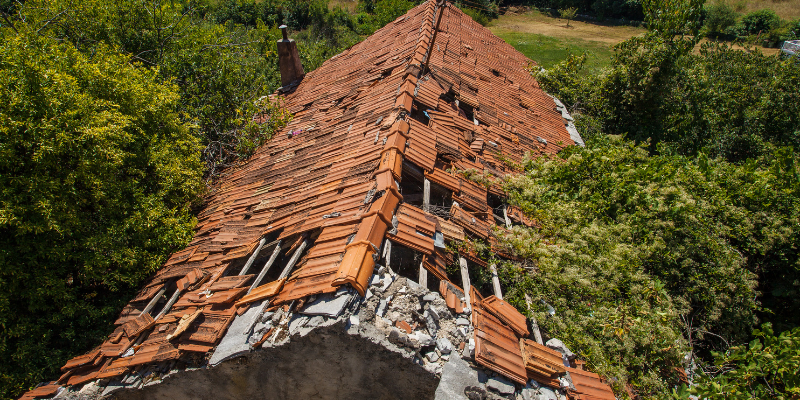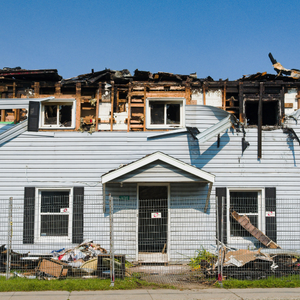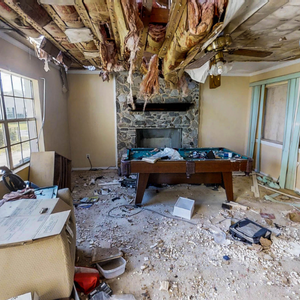
Are you stressed about selling your house because you think nobody wants a fixer-upper? You’d be surprised how many people are actually looking for exactly what you’ve got.
At Direct MD Cash Buyers, we buy houses in any condition—no repairs, no updates, no hassle. We know you’ve been putting off that roof repair since Obama was president and your kitchen cabinets are giving serious 1970s vibes. Let us show you how easy it can be to sell your less-than-perfect Maryland house and walk away with cash in hand!
Can You Sell a House in Poor Condition in Maryland?
Yes and don’t let anyone tell you otherwise. Maryland doesn’t care if your house is magazine-ready or if it needs some serious work. You can sell it either way.
You just have to be honest about what’s wrong with it. Maryland law says you need to tell buyers about any problems you know about, but that doesn’t stop you from selling. With Maryland homes selling for around $490,000 on average, there’s definitely space in the market for houses that need work and are priced accordingly.
What Constitutes Bad Property Condition
Not all problem houses are the same. You need to know what category yours falls into to figure out your next move.
Uninhabitable Properties

These houses have serious safety issues, so they are unsafe to live in right now. They have electrical systems that could start fires, plumbing so bad there’s no running water, roofs with holes you could throw a football through, or a house with mold that’s taken over entire rooms.
Foundation cracks that make the floors uneven or termite damage that compromises the structure also fall here. These houses need major investment before anyone can safely call them home.
Major Repairs Required
Your house works, but barely. The HVAC system wheezes through another summer. The roof keeps most of the rain out, but not all of it. The kitchen appliances are older than your youngest kid and twice as temperamental. The bathroom hasn’t been updated since the Clinton administration.
These houses are livable, but everyone knows the big-ticket items are going to need replacing sooner rather than later. The good news? You can sell a house with foundation problems, a house with fire damage and other aging systems—buyers just need to see the value in the deal.
Significant Cleaning or Renovation Needed
Your house is structurally sound, but it looks like it’s been through a rough patch. Perhaps it’s cluttered from years of accumulated items. The carpet has stains that tell stories you’d rather forget. The paint is peeling because it’s just old. The yard looks like nature’s been winning the battle for the last few seasons.
These houses just need some serious elbow grease and maybe a good cleaning crew to look presentable again.
Maryland Disclosure Laws for Bad Condition Properties You Must Follow
Maryland has a Residential Property Disclosure and a Disclaimer Statement, and you can’t avoid it. We regret to inform you that completing this form is required, regardless of preference.
When you fill out this form, you’re like ratting out every single thing wrong with your house. Ever see a mouse scurrying across your kitchen floor at 2 AM? They want to know about pest problems. Is the water pressure in your shower pathetic? Put it down. That time your basement flooded and you pretended it never happened? Time to come clean.
They’re asking about everything! Electrical weirdness, plumbing disasters, HVAC that sounds like a dying whale, septic issues, well water problems, asbestos, lead paint, flood zones, and HOA fees that keep going up. If it’s broken, funky, or might bite someone later, it goes on the list. Luckily, you can still sell your home for cash in Columbia or nearby cities, no matter the condition.
Understanding Latent Defects Under Maryland Law
Latent defects are the problems hiding in your home that would take a good inspector to find, but could really hurt someone.
These are scary things behind your walls or under your floors that nobody can see, but could make people sick or unsafe. For example, there’s old wiring that’s a fire hazard tucked away where nobody looks, or pipes that are slowly leaking and creating mold behind the drywall.
Even if you’re selling as-is and don’t want to fix anything, Maryland still says you have to tell buyers about this hidden junk if you know it’s there. The catch is you actually have to know about it.
If your brother-in-law, who thinks he’s a contractor, once mumbled something about your electrical setup being “interesting” and you’ve been ignoring him ever since, well, that counts as knowing.
Best Way to Sell a House in Bad Condition in Maryland
There are three options when selling a home in bad condition. Of course, each has pros and cons depending on how much time, money, and sanity you want to spend on this whole thing.
Sell As-Is Without Repairs
This is the “take it or leave it” approach, and it might be your best option right now. You slap an “as-is” sticker on your home and tell the world exactly what they’re getting, problems and all.
You’re not fixing the leaky faucet, you’re not painting over those mystery stains on the ceiling, and you’re definitely not replacing that carpet that’s seen better decades.
The buyers know what they’re signing up for, and you get to walk away without spending another dime on repairs. Sure, you’ll probably get less money, but you also get to keep your weekends free and your credit card bills manageable.
Make Minimal Cosmetic Improvements
This is the “lipstick on a pig” strategy, but sometimes a little lipstick goes a long way. You’re not gutting the kitchen or replacing the roof, but you might slap some fresh paint on the walls, deep clean everything until it sparkles, and maybe replace those light fixtures that look like they belong in a horror movie. You’re gonna spend a few thousand instead of tens of thousands.
The goal is to make your home look less scary so buyers can see past the surface stuff to the potential underneath.
Invest in Major Repairs
This is the “go big or go home” option, not for the faint of heart or the light of wallet. You’re talking about fixing the big scary stuff, like a new roof, HVAC overhaul, foundation work, and kitchen gut job.
This route can get very expensive for sellers, but if you’ve got the cash and the time, it might get you closer to full market value. Just know that once you start pulling up old flooring, you might find more problems hiding underneath. Your budget can spiral faster than a reality TV renovation show.
Step-by-Step Guide: Selling Your House As-Is in Maryland
Selling as-is sounds simple in theory, but there are actually a bunch of steps sellers need to follow if they want to do this right. Here’s the whole process so you don’t miss anything important.
Assess Your Property’s Condition and Value
You need to know what you’re dealing with here. Get a notebook and walk through your house with zero sugar-coating allowed. Write down that wobbly banister you’ve been putting off for five years, the bathroom grout that’s gone from white to brown to something that defies description, the basement that always smells funky and you’ve stopped noticing, everything.
Stop pretending broken things are quirks and call them what they are. Once you’ve made your brutal reality check list, look up what other houses in your neighborhood sold for recently. Then, start subtracting money for every single problem you wrote down.
Choose Your Selling Method
You can hire a real estate agent who deals with fixer-uppers, sell directly to cash buyers who specialize in problem properties, or try to do everything yourself.
Agents cost you commission, but they know how to market a house that needs work and might get you more money. Cash buyers move fast and don’t care if your place looks rough, but they’re going to offer you less because they know you need out quickly.
Going solo saves on fees but means you get to handle every single phone call, showing, and lowball offer that comes your way.
Complete Maryland Disclosure Requirements
Remember that Maryland Residential Property Disclosure form we talked about earlier? Now’s the time to fill it out with painful honesty. Don’t try to downplay that leak in the basement or forget to mention the electrical outlet that sparks sometimes.
Write down every single thing you know is wrong, broken, or just plain weird about your house. The buyers are going to find out eventually anyway, so hiding stuff now just gives them ammunition to sue you later. Just rip the band-aid off and tell them everything up front.
Find the Right Real Estate Professional
If you decide to go with an agent, you can’t just pick any random person with a real estate license. You need someone who’s dealt with problem houses before and won’t bat an eye when they see your kitchen from 1987.
Look for agents who actually list fixer-uppers in their marketing materials or have sold other as-is properties in your area recently. Ask them straight up how many distressed properties they’ve handled and what their average days on market look like for houses that need work.
A good agent won’t sugarcoat your situation or promise you miracles. They’ll tell you exactly what to expect and how long it’s probably going to take to find a buyer willing to deal with your house’s issues.
Price Your Property Appropriately

Your house is not worth what the perfect one down the street sold for last month. Take that comparable sale price and start chopping off chunks for every single thing that’s broken, outdated, or just plain gross.
Subtract fifteen grand for that roof that needs replacing in the next two years? Knock off another eight thousand for the HVAC system that makes weird noises and barely keeps up. The kitchen that time forgot? There goes another twenty thousand minimum.
Be ruthless about this because buyers definitely will be. Price it too high and your house will sit there collecting dust while everyone walks past it to look at the move-in ready places. Price it right and you might actually get some action from investors and bargain hunters—or you can skip the hassle entirely and sell your home for cash in Frederick or nearby cities.
Prepare Your Home for Showings
Don’t get confused here. Preparing for showings when you’re selling as-is doesn’t mean fixing everything. It means making your disaster look like an organized disaster.
Clean everything you can actually clean. Throw out the junk that’s been collecting in corners for the past decade. Cut the grass so it doesn’t look like you’re trying to recreate a prairie in your front yard. Fix the lightbulbs that have been burned out since your daughter had her debut. Open all the curtains and let some actual daylight into the place.
You want buyers to see the potential in your house, not back out because they think it’s haunted. A clean, decluttered mess is way more appealing than a dirty, cluttered mess.
Market Your As-Is Property Effectively
Your listing needs to scream “as-is” so loud that even the most optimistic buyers know exactly what they’re getting into. Use phrases that make it clear, “sold in current condition,” “handyman special,” “priced to reflect needed updates,” or just plain “as-is sale.” Don’t try to hide behind cute euphemisms about “character” or “vintage charm” when what you really mean is “this place needs serious work.”
You should also take decent photos that show the house honestly, but don’t make it look worse than it actually is. Skip the staging and just make sure every room is clean and bright.
Your target buyers are investors and people hunting for deals. They want to see the bones of the house, not get fooled by pretty decorations.
Negotiate Offers
The offers are going to hurt your feelings at first. Buyers know you’re desperate to sell as-is and they’re going to lowball you harder than a used car salesman. Don’t take it personally; this is just business.
Some offers will be so insulting you’ll want to frame them and hang them on your wall for laughs later. Others might be surprisingly reasonable once you factor in all the work the buyer’s going to have to do.
Look at each offer and calculate what you’d actually net after repairs if you tried to fix everything yourself. Sometimes, that lowball offer starts looking good when you realize you’d spend thirty thousand just getting your house market-ready.
Counter if you think there’s room to negotiate, but don’t get greedy.
Handle Inspections and Appraisals
Here comes the fun part – watching someone with a clipboard poke around your house and document every single thing that’s wrong with it. The buyer’s inspector is going to crawl through your crawl space, climb up on your roof, and test every outlet, faucet, and light switch in the place.
They’re going to find stuff you didn’t even know was broken. Don’t panic when the inspection report comes back longer than a grocery list. That’s exactly what you expected when you decided to sell as-is.
The whole point of selling as-is is that the buyer can’t come back later demanding you fix the leaky pipe or replace the ancient water heater. Just make sure your purchase agreement clearly states that you’re not making any repairs based on inspection findings. Some buyers will still try to negotiate the repairs after the inspection, even after agreeing to buy as-is.
Close the Sale
Don’t celebrate yet because closing can still go sideways in spectacular fashion. The buyer’s lender might get cold feet when they see the appraisal or inspection report. The title company might dig up some ancient lien you forgot about from fifteen years ago. The buyer might suddenly decide your house is too much work after all and try to back out at the last minute.
Stay on top of everything and keep your agent or attorney in the loop about any hiccups. Have all your paperwork ready and double-check that you’ve disclosed everything you’re supposed to disclose. Pray to whatever higher power you believe in that nothing major falls apart in the final stretch. Once you sign those papers and get that check, you’re officially done dealing with your problem house forever.
Buyer Financing and Property Standards
Most banks will take one look at your house and go the other way. They’re not trying to be mean. They just don’t want to lend money on something that might collapse before the mortgage is paid off.
Your buyers who need loans are going to have a rough time if your house has serious problems. Meanwhile, FHA loans will reject anything with peeling paint or missing handrails because they’re worried about lead poisoning and people falling down stairs.
VA loans have their own picky rules, too. Even regular bank loans draw the line somewhere.
Cash buyers are basically your salvation here because they don’t need anyone’s permission and couldn’t care less if your electrical panel looks sketchy. Just don’t get your hopes up if someone shows up with pre-approval letters and your house needs major work. That deal’s probably going to blow up in your face when their lender sees the inspection report.
How to Calculate Your Expected Sale Proceeds
First off, look into how much the nice houses on your block sold for. Knock off 20% just for selling as-is because buyers expect a discount for dealing with your problems. Then subtract what it would cost to fix everything.
Don’t forget you’re paying an agent commission and closing costs, too. By the time you’re done with this depressing exercise, you’re looking at maybe 65% of what a perfect house would bring in.
Cash buyers who flip houses will offer even less because they need to make money, too. But at least you won’t spend the next six months living with contractors and eating takeout every night because your kitchen’s torn apart.
Why Consider Cash Buyers When Selling As-Is?
Cash buyers see the worst cases and don’t flinch. They’re already calculating how much money they can make fixing it up while regular buyers are still making a decision.
These people buy houses for a living, and they’ve seen everything. Your peeling wallpaper doesn’t scare them, as well as your ancient plumbing and outdated kitchen. They’ll give you an offer within 24 hours and close in two weeks. You never have to show your house to another soul who’s going to point out every single thing that’s wrong with it.
Sure, they’re not going to pay you top dollar, but they’re also not going to disappear when their lender sees your inspection report. They bring actual cash to the table, not promises. If you’re tired of dealing with your problem house and just want it gone, cash buyers can give you freedom.
Frequently Asked Questions
Can I sell my house if it has mold problems?

Yes, but you’d better tell buyers about it upfront. Mold is one of those things that makes people panic, but cash buyers and investors deal with it all the time. You’ll need to disclose the mold on your Maryland disclosure form, and yeah, it’s going to hurt your sale price. But many buyers will still take it off your hands, especially if you price it right. Just don’t try to hide it because that’s a lawsuit waiting to happen.
Do I need to get my house inspected before selling as-is?
You don’t have to, but it’s not a terrible idea. Getting your own inspection before listing tells you exactly what buyers are going to find later, so you can price accordingly and avoid surprises. Plus, if buyers try to negotiate based on inspection findings, you can point out that you already factored those repair costs into your asking price. It costs a few hundred bucks but might save you headaches later.
What if my house doesn’t meet code requirements?
Most old houses have code issues. It’s just part of owning something built before everyone got obsessed with permits for everything. You need to disclose any code violations you know about, but it doesn’t mean you can’t sell. Cash buyers especially don’t care about code issues because they’re planning to renovate anyway. Regular buyers with financing might have problems, but that’s their issue to figure out.
How long does it take to sell a house in bad condition in Maryland?
It depends on how bad we’re talking and how realistic you are about pricing. If you price it right and market it to investors, you might get offers within a few weeks. If you’re being stubborn about price or your house needs to be condemned, it could sit for months.
Cash buyers can close in two weeks if you go that route, which is way faster than dealing with financed buyers who might bail when their lender sees your inspection report.
Should I hire a lawyer when selling as-is?
Maryland doesn’t require attorneys for real estate closings, but if your house has serious issues or you’re worried about liability, spending a few hundred on a lawyer isn’t the worst idea. They can review your disclosure forms, make sure your purchase agreement protects you, and handle any weird title issues that pop up. It’s especially smart if you’re selling to cash buyers you’ve never heard of before.
Key Takeaways: Selling a House in Bad Condition in Maryland
Selling a house that’s seen better days isn’t the end of the world, even though it might feel that way when you’re standing in your basement watching water drip from the ceiling. Maryland law requires you to be honest about your house’s problems, but it doesn’t stop you from selling them. Price your house like the fixer-upper it is, not like the dream home you wish it were. Also, be prepared for offers that make you want to cry. Those lowball offers may look pretty good when you calculate what you’d actually spend fixing everything yourself.
Is your house in bad condition, and you need to sell? Avoid costly repairs, skip the stress of renovations, and sell your property as-is. Direct MD Cash Buyers is here to help. We buy houses in any condition, offer fair cash offers, and handle all the details to make the process seamless. Ready to sell or have questions? Contact us at (443) 391-7080 for a no-obligation offer. Get started today!
Helpful Maryland Blog Articles
- Selling Your Home By Owner In Maryland
- Selling A Probate House In Maryland
- Selling Your Home During A Divorce In Maryland
- Selling Your Maryland Home During Foreclosure
- Filing A Quitclaim Deed For Real Estate In Maryland
- Selling Tenant Occupied Property in Maryland
- Selling a House in Bad Condition in Maryland
- Who Pays Taxes When Selling a House in Maryland?
- How to Handle an Inherited House with Sibling in Maryland
- How Do I Get My Name Off a Mortgage in Maryland?
- Can You Sell A House with Asbestos in Maryland
- Can the Seller Back Out of A Contract in Maryland
- How to Sell A Condemned House in Maryland

